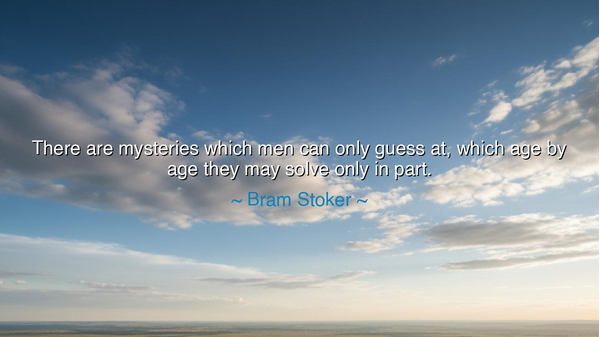
There are mysteries which men can only guess at, which age by age
There are mysteries which men can only guess at, which age by age they may solve only in part.






In the great tapestry of existence, where the threads of knowledge, mystery, and discovery intertwine, there are questions that stir the soul and beckon humanity to seek. Yet, as Bram Stoker so eloquently puts it, “There are mysteries which men can only guess at, which age by age they may solve only in part.” These words echo a truth as old as time itself: there are forces in the universe, truths hidden from our understanding, that we can only approach and never fully comprehend. The pursuit of knowledge is not a path to perfect clarity, but a journey of gradual revelation, where each generation uncovers a little more, but never all. The mysteries that elude us are as much a part of our human condition as the quest to uncover them.
What, then, does it mean that mysteries can only be solved in part? It is the nature of human life to seek the unknown, to ask questions that stir the mind and soul. But in doing so, we are reminded that some truths are beyond the reach of any one person or any single era. The quest for knowledge is a continuous process, a puzzle whose pieces may be gathered over centuries, but never completely put together. There are mysteries—of the universe, of the self, of life and death—that we can only understand partially, with each generation contributing a small piece to the greater whole, never fully realizing the entire picture. This incomplete understanding is not failure; it is simply the nature of existence.
Consider the ancient philosophers who pondered the fundamental questions of life—who we are, why we exist, and what the world is made of. Socrates, in his pursuit of knowledge, famously declared that he was the wisest of all men because he knew that he knew nothing. His journey, like that of all great thinkers, was not about reaching the end of the road, but about embracing the questions themselves. The search for wisdom, Socrates knew, is a path that never reaches its destination, but rather deepens with each step. His philosophical inquiries gave birth to more questions than answers, yet they laid the foundation for all future intellectual inquiry. The mysteries of existence remained unresolved, but Socrates contributed a piece to their understanding that would echo through the ages.
The story of Galileo Galilei, too, illustrates the nature of these mysteries. Galileo, the great astronomer, discovered that the Earth revolves around the sun, a revelation that shook the very foundation of belief. His telescope allowed him to peer into the heavens, to witness the stars and planets, and to challenge the long-held views of the cosmos. Yet, even as he made revolutionary discoveries, he could only solve a part of the mystery of the universe. His discoveries sparked more questions, not only about the heavens, but about the very nature of knowledge and truth itself. Galileo’s work did not end the pursuit of the cosmic mystery, but it propelled humanity forward, demonstrating that the more we uncover, the more we realize how much is still hidden.
The mysteries of the world, as Stoker suggests, are often intertwined with fear and wonder. When we encounter the unknown, we are confronted with the limits of our understanding, and this can be both exhilarating and humbling. Fear of the unknown drives us to seek knowledge, but it also teaches us humility. The mysteries that Stoker refers to—whether they are of life, death, the divine, or the nature of the universe—serve as constant reminders that we are not omniscient beings. Our place in the vastness of the cosmos is one of discovery, but we must also embrace the limitations of our understanding. There is beauty in this, for it ensures that the journey of knowledge is never complete, but an endless cycle of learning and growth.
The lesson of Stoker’s words is one of patience and humility. We are called not to despair at the mysteries that remain unsolved, but to continue the quest with dedication and an open heart. Our role in the great narrative of human existence is not to provide all the answers, but to contribute what we can, knowing that the answers we uncover may only lead to more questions. The pursuit of truth is a shared journey, one that requires each generation to build upon the foundation laid by those before them. The mysteries are eternal, and so is our pursuit of understanding.
Therefore, let us continue the search, not as those who expect to reach the final answer, but as those who embrace the journey itself. Let us celebrate the mysteries that draw us forward, and approach them not with frustration, but with the joy of discovery. In this way, we honor not only the unknown but also the human spirit, which refuses to rest, to be satisfied with ignorance, and instead seeks the light of knowledge, even if that light is always dim, flickering just beyond our reach. As we ask our questions and find our answers, we participate in the eternal quest to understand the mysteries that make us human.






AAdministratorAdministrator
Welcome, honored guests. Please leave a comment, we will respond soon